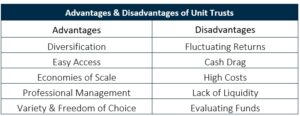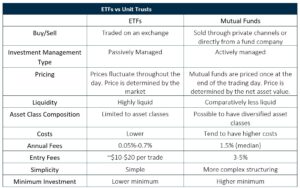
16 Aug COMPARISON OF ETFs & MUTUAL FUNDS
Exchange-traded Funds (ETF) and Mutual Funds (commonly known as Unit Trusts) originate from the concept of pooled fund investing. They are effective investment products to offer diversification to the market and economies of scale to your portfolio.
However, there are fundamental differences that must be taken into consideration when deciding where to allocate your investments.
Exchange-Traded Funds (ETFs)
An ETF is a type of financial instrument that tracks a specific index, sector, commodity, or even investment strategy. ETFs have benefitted tremendously from the rising popularity of low-cost and diversified index fund management. Per Statista, the assets under management (AUM) of global ETFs increased from 417 billion U.S. dollars in 2005 to over 7.7 trillion U.S. dollars in 2020.
As the name suggests, ETFs are traded on exchanges, with its mechanisms being similar to shares. The prices of ETFs instantaneously reflect the reality of the current market conditions. ETFs can be traded at any point during a trading session at whatever it is currently priced at. Since ETFs are continuously traded, there is the potential for trading to take place at a price other than the true net asset value (NAV) of the ETF. In addition, there is no minimum holding period. Therefore, there is high liquidity.
Since ETFs are index-tracking, they attempt to match the returns and price movements of an index. As a result of its passive investment strategy, ETFs tend to be cheaper. ETFs are also cheaper due to the mechanical relationship it possesses between the fund and their shareholders. ETFs are traded on an exchange; hence it entails that buyers and sellers directly do business with one another. As a result, managers have far less to do.
An example of a well-known ETF is the Vanguard S&P500 ETF (ticker: VOO) that tracks the S&P500 index. In this instance, investing in the VOO allows an investor to receive exposure to the performance of the S&P 500.
Mutual Funds
A mutual fund, commonly known as unit trusts as well, shares many similar properties to an ETF. A mutual fund pools money from a large number of investors to invest into financial securities such as stocks, bonds, money market instruments, and other financial securities.
Mutual funds enable individual investors to access professionally managed portfolios as these funds are managed by professional management companies such as Fundsmith, Blackrock, and Fidelity amongst others. The fund manager oversees the investment of the funds by allocating investments in accordance with the investment objective of the fund stated in its prospectus.
While some mutual funds are passively managed, many investors look to these securities for the added value that they can offer in an actively managed strategy. For these investors, active management is the key differentiator as they rely on a professional manager to build an optimal portfolio as opposed to passively following an index. Fund managers pick a variety of holdings aimed at outperforming an index that they benchmark their performance against.
As a result of its active investment strategy, they generally charge higher fees to investors who buy shares in their funds. A fund’s expense ratio is reflective of the summation of the advisory or management fee and its administrative costs. These fees pay for the costs of running a portfolio, from paying the investment analysts to the rent of their offices, etc. Therefore, in general, mutual funds are more expensive to run – and for investors to own – as opposed to ETFs.
The price of a mutual fund share is referred to as the net asset value (NAV) per share. A fund’s NAV is calculated by adding up the value of its investments and deducting the total liabilities that the fund holds. Each shareholder participates proportionally in the gains or losses of the fund. A fund’s NAV does not fluctuate during market hours. Mutual fund trades close at the end of the day. Hence, mutual funds are priced based on a NAV at the end of the trading day.
Returns from a mutual fund are earned in three ways:
- Income is earned from dividends on stocks and interest on bonds held in the fund’s portfolio. A fund distributes nearly all of its income it receives over the year to the fund owners. Investors can choose to receive a cheque or reinvest their earnings in order to receive more shares through a dividend reinvestment plan (DRIP).
- Capital gains if the fund sells securities that have increased in price. Often, the fund passes on these gains to investors in a distribution.
- Fund holdings increase in price but are still held by the fund manager. As a result, the share prices of the fund increase. You can then liquidate your position by selling your mutual fund shares for a profit in the market.

Comparison

The Bottom Line
Investors looking for diversification often resort to incorporating funds into their portfolios. Given the distinctions between an ETF and a mutual fund, which one is better? ETFs and mutual funds are no better than one another. It really depends, as each can fill certain needs.
For investors who want to keep it simple, ETFs are a better option. This is due to their combination of low costs, ease of access, and emphasis on index tracking. The ability of mutual funds to provide exposure to various markets in a straightforward manner makes them useful tools to accumulate long-term wealth with a balanced and broadly diversified portfolio.
However, mutual funds are better if you value the potential to outperform the market through active investment management. Mutual funds provide access to obscure niches, including stocks of smaller foreign companies and complex yet potentially rewarding areas such as market-neutral or long/short equity funds that feature esoteric risk/reward profiles.
The right investment product for you is dependent on the best investment strategy to incorporate based on your investment objectives and needs.
Deepak Singh is an Authorised Representative of Global Financial Consultants Pte Ltd – No: 200305462G | MAS License No: FA100035-3
To book a complimentary meeting, and explore how we can assist you, please use the following details.

☜ https://calendly.com/deepakadvisory/introductory-meeting-our-office
General Information Only: The information on this site is of a general nature only. It does not take into account your individual financial situation, objectives, or needs. You should consider your own financial position and requirements before making a decision.
*Please note that Deepak Singh is not a tax agent or accountant and none of the content outlined here should be taken as personal advice. You should consult your tax agent and financial adviser to review your current personal finances and financial goals to consider whether this strategy is appropriate for you.
References
https://www.investopedia.com/articles/investing/110314/key-differences-between-etfs-and-mutual-funds.asp
https://www.investopedia.com/ask/answers/09/mutual-fund-etf.asp
https://www.statista.com/topics/2365/exchange-traded-funds/#dossierSummary
https://www.cnbc.com/2020/05/29/why-investors-are-pouring-trillions-into-exchange-traded-funds.html
https://www.investopedia.com/terms/m/mutualfund.asp
https://www.investopedia.com/articles/investing/110314/key-differences-between-etfs-and-mutual-funds.asp
https://www.investopedia.com/terms/m/mutualfund.asp#understanding-mutual-funds
https://www.investopedia.com/ask/answers/09/mutual-fund-etf.asp
https://www.stashaway.sg/r/etfs-versus-unit-trusts
https://www.schwab.com/resource-center/insights/content/etf-vs-mutual-fund-it-depends-on-your-strategy
https://www.fool.com/investing/how-to-invest/etfs/etf-vs-mutual-fund/
https://www.nerdwallet.com/blog/investing/etf-index-funds-vs-mutual-funds/
https://www.bankrate.com/investing/mutual-fund-vs-etf-which-is-better/

